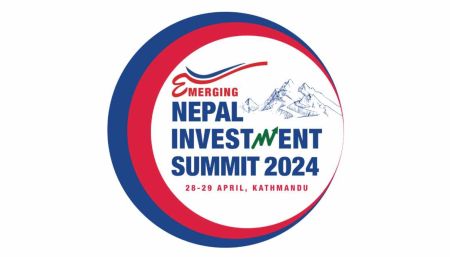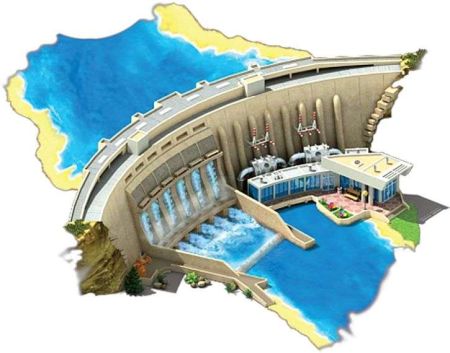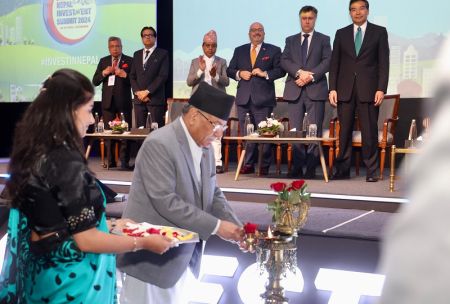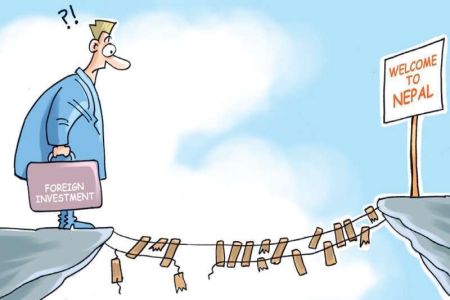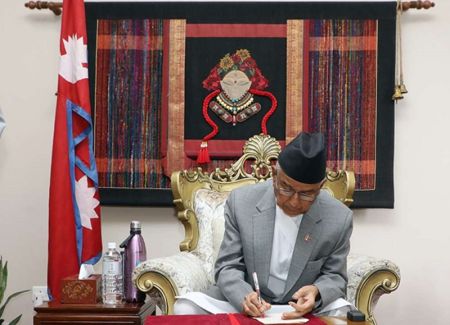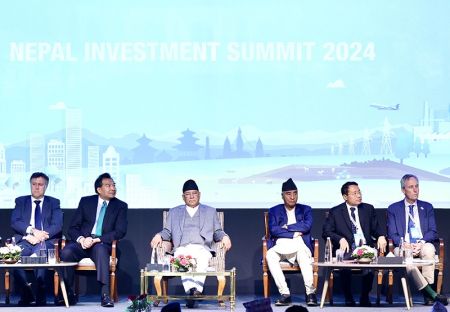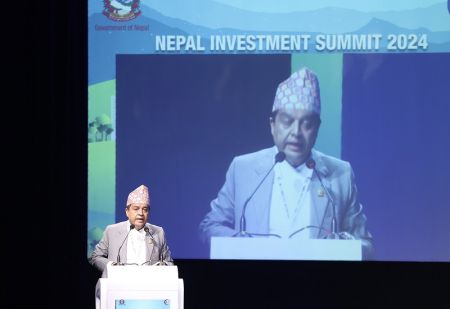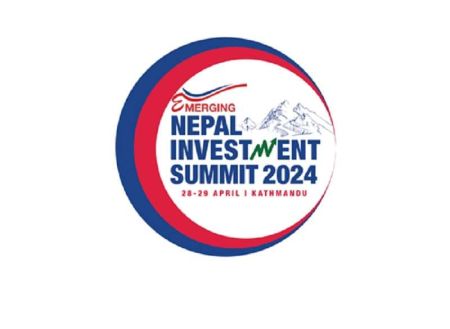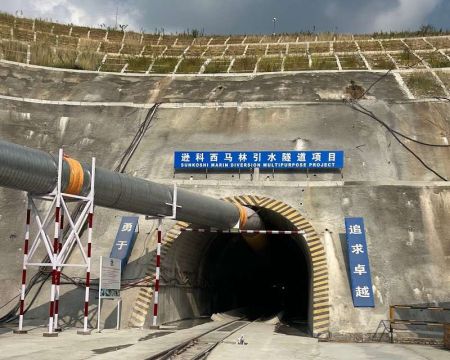 Prof Dr Dev Raj Adhikari
Prof Dr Dev Raj Adhikari Head, Central Department of Management
Tribhuvan University
What is driving the growth of management schools in Nepal?
The growth you are talking about is the growth of management education. Four universities namely Kathmandu, Pokhara, Purbanchal and Tribhuvan University (TU) - the oldest one in the country - are contributing to the growth of management studies. Along with the growth in number of students and faculty, there is also the growth in demand for the products in the market. Market is also growing. Currently, we can see quantitative growth but there is impressive qualitative growth too. Recently, a report of Ministry of Education has revealed that the number of students going for foreign education has dropped. Management education has grown both qualitatively and quantitatively.
What are the emerging trends in management studies?
We are talking about globalisation today. That automatically reflects in our curriculum. Our curriculum cannot always be taught in the same old traditional methods because our students have to compete in the international market. The demand is growing for change and advancement in the management studies’ curriculum. The teaching-learning model also needs to be reformed. Some schools have adopted really good methodology but in our MBS, we have not been able to achieve the global standards due to a large number of students.
The teaching-learning methodology is often criticised for being traditional. How have the management schools tried to change the traditional practices?
Some of the institutes are practising methods like project works, case studies and participatory techniques in classrooms. They are encouraging team work and group work. Students are often taken for industrial tours and field visits. Professionals and entrepreneurs are giving lectures while visiting faculties are being sourced from foreign universities. These are now being practised in Nepali colleges. They are trying their best because they are getting money and need to satisfy the parents and students. I have seen bank CEOs addressing the classes. Some institutes even have the system of dual faculties in which one is academician while the other may be a professional. Academician teaches theory while the professional shares his real work-life experiences. He may be the HR director of a certain bank or even a CEO. Now, MBA has become competitive. Market will judge in the future if one can or cannot deliver. Teaching-learning method is not that much traditional as in the past. In MBS, traditional method is also being used. The most popular method in the world is the lecture method. When the classroom is small and focus is on a particular group, we can go for case studies, game theories, project works, participatory techniques, create decision making opportunities. But in a large class, the same is not possible. It is being traditional because we don’t have environment to use new tools and pedagogy. Some classes are traditionally run but the cases have changed a lot compared to the past. In the coming ten years, there will be a lot of changes.
What is our competency compared to the level of regional and international universities?
It is very difficult to say what exactly is our competency compared to other universities, especially those in India. Currently, in the growth of Indian management education, quality is especially seen in state universities and management institutes like IIM, Ahmedabad. We have not reached that level of quality in education. Here, Pokhara, Kathmandu and Purbanchal universities are leading in MBA. They have changed with time and have created the course well with a lot of planning but so far the implementation is missing. We are lagging behind in regional and international perspectives. But the TU MBS can be easily compared to Indian quality. Curriculum is good and our MBS course can be compared with good universities in India. So, what we can safely say in MBA we still have to do a lot of things because growth in business here does not have the same pace as in India. Our internship level can by no means be compared with theirs. We have also not been able to provide facilities and educational environment that Indian MBA students get. In such a case, we can’t compare with them. Nevertheless, we are trying our best; our universities are trying for something similar.
Are our colleges, courses and degrees internationally recognised?
TU is recognised worldwide as the largest university of Nepal. Any master’s degree holder from TU need to do further studies if he wants to pursue further studies in the US. MBS graduates again need to do MBA there. In USA, to do an MBA, one must compulsorily have two years of work experience but it does not apply here. And they must also appear in GMAT. Here one can directly join MBA after bachelor’s degree. So, there is no direct recognition but our education is not derecognised anywhere in the world. Though they don’t give exact equivalence, after completing some credit hours and some courses, our degrees are recognised well.
What is our curriculum targeted at – producing job seekers or job creators?
We should try to develop professional entrepreneurship as well. It is engraved in our culture that after completion of studies, everyone must do some kind of job. Everyone expects to get a good job. But there are some students who really want to develop as a professional or an entrepreneur. Some of my own students are aiming to create jobs through their entrepreneurship. More than 95 per cent students are job seekers either in national, Indian or international markets. But only a few are willing to develop as a professional or an entrepreneur. Some MBA students have even established their own cooperatives and finance companies.
How does the management course bridge the gap between real life workplace and the lessons taught in classrooms?
We need good teaching-learning method to bridge the gap between classroom and the workplace. The environment in the class must be such as the students can begin working immediately after completing the education and can adapt to the work environment. Similar kind of pedagogy, customisation and workplace-friendly curriculum must be selected. Then, we need the curriculum in accordance to the business expectation. That will bridge the gap between the classroom and the workplace otherwise there will be a difference always. If we can not bridge this gap, organisations will have to invest a lot in training and development of the new recruits from the management stream. So, these days, management colleges are focussing on training for a banking career to MBAs as the banking and finance sector is our major job market. If the gap is to be bridged, we have to make the classroom workplace friendly and design the curriculum accordingly. We have that curriculum but if we also have the similar delivery we can minimise the gap.
How do you see the current trend of colleges being affiliated to foreign universities?
If you look at it through competition and curriculum, our local universities are in forefront. If you compare the foreign university curriculum with Nepali counterparts, we have a much better curriculum. Nepali universities are already customised with local environment while Indian university cannot be customised. You have to run according to their curriculum. Our curriculum is customised according to our culture, system, economy, situation, need and expectation. That way our curriculum is excellent and those courses have not proven any threat to us. But that does not mean it is time to stay idle. The way foreign universities are coming, they have changed the teaching-learning method. Concept of dual faculty has been introduced in Indian university affiliated colleges. It is a challenging system. That will challenge us in the future. British, American and Indian universities are willing and are coming to Nepal. However, they are mostly offering distance education, so far. Till date, we have a strong curriculum and we are not facing any threat from universities.
Most of the leadership positions in the private sector banks and corporate houses are being held by MBA graduates from foreign universities. How do you react to this?
Companies must have found some difference in these foreign graduates. They must have certain unique personality and knowledge. But that knowledge, skill, efficiency will be transferred gradually to ours too. This will not be the same forever. In the days to come, Nepali MBA graduates can also do that. It is only a matter of time. It may take a few years or a few decades. India has a long history in management studies and MBA while we have just begun teaching MBA. Such things are not negative. We can learn from them and analyse what we lack and what special they have got. Students must self actualise and they can develop themselves accordingly.






